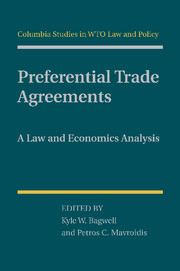Book contents
- Frontmatter
- Contents
- Contributors
- Introduction: The Law and Economics of Contingent Protection
- 1 Preferential Trading Agreements: Friend or Foe?
- The “Legalization” of GATT Article XXIV – Can Foes Become Friends?
- 2 Third-Country Effects of Regional Trade Agreements
- 3 Contingent Protection Rules in Regional Trade Agreements
- 3.1 Commentary on “Contingent Protection Rules in Regional Trade Agreements”
- 4 The Limits of PTAs
- 5 EU and U.S. Preferential Trade Agreements: Deepening or Widening of WTO Commitments
- Straightening the Spaghetti Bowl
- 5.1 Comments on “Beyond the WTO? Coverage and Legal Inflation in EU and U.S. Preferential Trade Agreements”
- 6 Labor Clauses in EU Preferential Trade Agreements – An Analysis of the Cotonou Partnership Agreement
- 7 Do PTAs Actually Increase Parties' Services Trade?
- 8 A Model Article XXIV: Are There Realistic Possibilities to Improve It?
- 8.1 Comments on “A Model Article XXIV: Are There Realistic Possibilities to Improve It?”
- Index
Introduction: The Law and Economics of Contingent Protection
An Introduction to the Volume
Published online by Cambridge University Press: 03 May 2011
- Frontmatter
- Contents
- Contributors
- Introduction: The Law and Economics of Contingent Protection
- 1 Preferential Trading Agreements: Friend or Foe?
- The “Legalization” of GATT Article XXIV – Can Foes Become Friends?
- 2 Third-Country Effects of Regional Trade Agreements
- 3 Contingent Protection Rules in Regional Trade Agreements
- 3.1 Commentary on “Contingent Protection Rules in Regional Trade Agreements”
- 4 The Limits of PTAs
- 5 EU and U.S. Preferential Trade Agreements: Deepening or Widening of WTO Commitments
- Straightening the Spaghetti Bowl
- 5.1 Comments on “Beyond the WTO? Coverage and Legal Inflation in EU and U.S. Preferential Trade Agreements”
- 6 Labor Clauses in EU Preferential Trade Agreements – An Analysis of the Cotonou Partnership Agreement
- 7 Do PTAs Actually Increase Parties' Services Trade?
- 8 A Model Article XXIV: Are There Realistic Possibilities to Improve It?
- 8.1 Comments on “A Model Article XXIV: Are There Realistic Possibilities to Improve It?”
- Index
Summary
The chapters assembled in this volume deal with preferential trade agreements (PTAs), a topic that has repeatedly attracted the interest of analysts. One might naturally wonder why we need to revisit this issue once again. We believe that there are various good reasons, not necessarily mutually coherent. First, from a pure policy perspective, it is the World Trade Organization (WTO) through its Director General that has placed this item among the priority items for (re)negotiation. Obviously, the feeling must be that something has not been functioning as expected. We want to explore the legitimacy of this claim. On the other hand, recent empirical research casts doubt to the old “trade diversion” school: papers have seen the light of day arguing that no (or insignificant) trade diversion has resulted from the formation of recent PTAs. If so, why should we deal with PTAs at all? Then there is the issue of content of PTAs: many recent PTAs (i.e., after the advent of the WTO) have a subject matter that does not come under the mandate of the WTO as we now know it. The obvious question in this context is what the role should be of the WTO when dealing with issues such as environmental protection or macroeconomic cooperation.
We have put together a stellar group of researchers to discuss this topic.
In his introductory piece, Alan Winters provides a helicopter view of the economics and policy issues surrounding PTAs.
- Type
- Chapter
- Information
- Preferential Trade AgreementsA Law and Economics Analysis, pp. 1 - 6Publisher: Cambridge University PressPrint publication year: 2011



